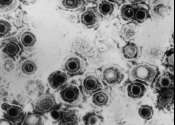Vaccine shows promise against herpes virus
A genetically edited form of a herpes simplex virus—rewired to keep it from taking refuge in the nervous system and eluding an immune response—has outperformed a leading vaccine candidate in a new study from the University ...
Nov 6, 2020
0
151








